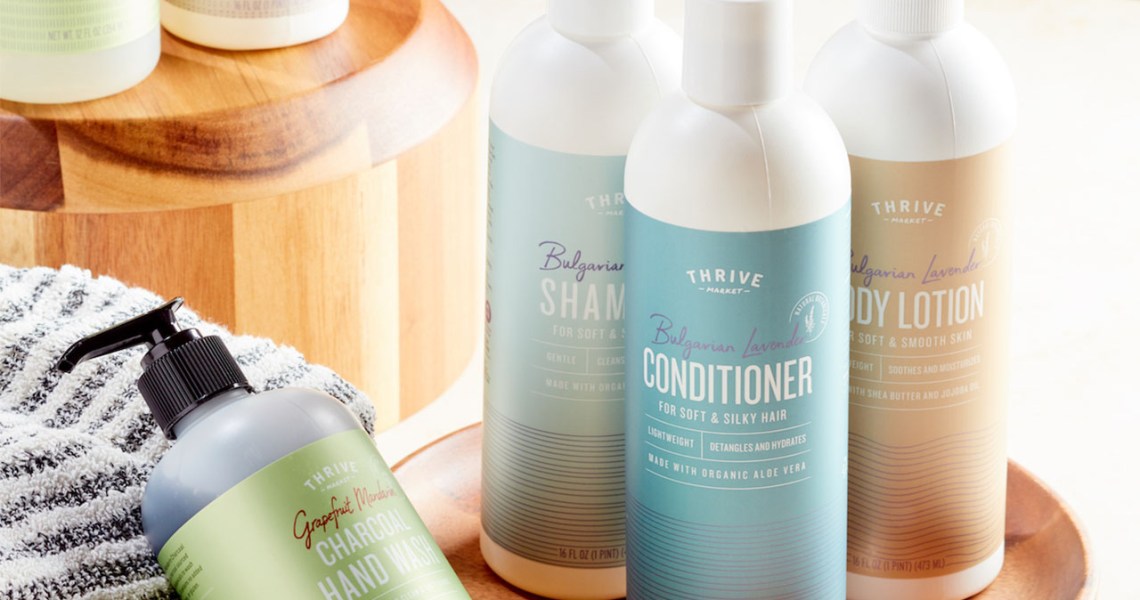Online retailer Thrive Market is the latest company to go after the personal-care category.
Thrive Market debuted in 2014 and offers natural and organic food and products at reduced prices through its yearly membership model. (It costs $59.95 to join.) This month, it launched an 11-piece proprietary collection of shampoos, conditioners, body lotions and hand washes. All products are $5.99 and retail for about 33 percent less than the industry average for similar beauty and bath products.
“When we launched, we thought about how to make healthy living accessible, and for us, that started with what you put in your body, like food and supplements. But we heard a lot of feedback from our members that they aren’t just thinking about their health in terms of what goes into their bodies but also what goes on them and what’s around them,” said Nick Green, Thrive Market CEO and co-founder. This is parallel to Unilever’s strategy for creating a master beauty wellness brand with its Love Beauty and Planet and Love Home and Planet lines. The latter launched in 500 beauty and wellness Target locations in early January.
According to Green, Thrive Market’s bath and body and beauty categories, which had previously consisted of only third-party brands, have outpaced even its food segment among its members, and have been experiencing double-digit year-over-year growth since 2016. (The company would not disclose 2018 revenue.) Thrive Market, which raised $111 in a Series B funding round in July 2016 and another $10 million in October 2016, has over 500,000 paying members, up from 300,000 just two years ago. Though Green said its average customer is anyone interested in healthier living, most members are “middle class, middle American moms.” The average household income of ThriveMarket.com customers is $75,000, and 85 percent are women. Additionally, over half of Thrive Market’s customers are based in the Southeast and the Midwest, with Minnesota and Texas serving as key markets. This is contrast with the customers of competitor Whole Foods, a large percentage of whom live in California and make upward of $200,000.
Thrive Market’s line of branded beauty and bath and body products provide a throughline to these women, who are looking at health and wellness in a broader context. The line itself takes its lead from best-selling labels the company carries, like wellness company Acure, which makes skin- and hair-care products, natural face and body line Desert Essence, and West African fair-trade brand Alaffia, which uses ingredients like shea butter. “What we are trying to do with our own branded line is learn from what other leaders in the category are doing well, as a starting point,” said Green. For instance, Green noted that products on ThriveMarket.com featuring shea butter have the highest reorder rate in the beauty and bath and body segments. Now, its branded lotions include this ingredient to fuel that demand. It’s worth noting that this collection was spearheaded by svp of merchandising and product development Jeremiah McElwee, who previously oversaw Whole Foods’ health and beauty department, Whole Body.
Thrive Market’s own private-label brand debuted in 2016 and cuts across other categories like food, frozen goods, vitamins and supplements, and kids and baby. The brand accounts for approximately 20 percent of total sales, and Green said it drives overall sales productivity across the site. “There have been different reasons to launch these branded collections, but coconut oil was the first, and while that was a cooking ingredient, people were using it as a beauty product, too,” he said. “That was a harbinger of things to come.”
Though Thrive Market has not revealed its social strategy for the branded personal-care collection, Green said it will be unveiling non-paid influencer marketing programs with Instagram and YouTube influencers later in the year. “Our customer isn’t someone that has a Whole Foods around them at every corner and just thinks that it is too expensive. Our customer is finding out about us online, so we know this collection will have a lot of success because of that,” he said.




